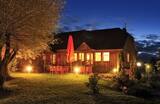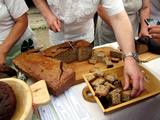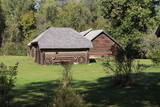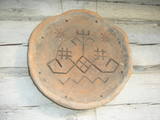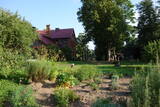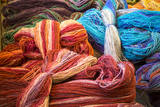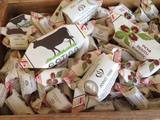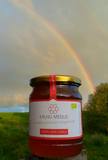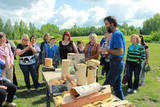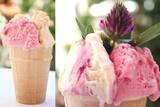| Nr | Name | Beschreibung |
|---|---|---|
|
Die Schänke befindet sich am Rande der Straße Murjani – Limbazi (P9). Sie ist auf den Fundamenten der Mühle des Landgutes gebaut worden, dabei wurde das Mühlenrad erhalten. Die Schänke arbeitet mit den lokalen Bauern zusammen. Lettische Küche: Steinpilzsuppe, Gerstengrütze mit Fleisch, Gerstenfladen, Grützwurst mit Preiselbeersoße, dünne Pfannkuchen mit Marmelade, Kartoffelpfannkuchen, gebratene Flunder oder gebratener Zander, geschichtetes Roggenbrot-Dessert. Das besondere Gericht: Geschmortes Kaninchen und gefülltes Truthahnfilet. |
||
|
Um In der Altstadt von Cēsis ein warmes Brot zu bekommen, kann man nicht nur den Anweisungen, sondern auch dem verlockenden Brotgeruch folgen, das durch den Bogen direkt zur Bäckerei führt. Das Brot wird aus den in Lettland biologisch angebauten Körnern gebacken, es wird mit natürlichem Sauerteig hergestellt. Brotverkostung, Erzählung über die Zutaten, Gärung und Backen eines gesunden Brotes. |
||
|
A unique farmyard that includes a full set of buildings typical of this area. The farmstead buildings reflect at least 300-400 years of Latvian nation-building development. In the area it is possible to stay in a dwelling house (2 rooms, two people each) and in the tents. Picnic places available. It is also possible to organize different events and activities. |
||
|
This is a unique exhibition of woven chairs, chair-making instruments, photographs, and other objects related to chair-making traditions from the late 18th to the mid-20th century. Ceramicist Īrisa Vainovska will talk about the pottery arts, offering decorative plates, interesting wind pipes and souvenirs. |
||
|
In dem Backprozess des Brotes von Lāči, das nicht nur in Lettland, sondern auch über die Grenze berühmt ist, werden seit langer Zeit gepflegte Meisterkenntnisse und Meisterfertigkeiten angewendet. Hier kann man Führungen bestellen, einen Brotlaib formen und backen, eine Mahlzeit in einem netten Wirtshaus zu sich nehmen und Produkte kaufen. Das aus Roggenmehl gebackene Brot ist eines der Identitätssymbole Lettlands. Lettische Küche: Cremige Steinpilzsuppe, verschiedene heiße Töpfe, Brotsuppe, Dessert des Bäckers. |
||
|
Spieķu darbnīca Siguldā aicina izdzīvot spieķa izgatavošanas procesu, kam ir vairāk kā 200 gadu sena vēsture. Darbnīcā ir iespējams pašiem apgleznot savu spieķīti, vai iededzināt rakstu zīmes un vārdus. Spieķīši ir atpazīstamākais un senākais Siguldas simbols, kas attīstījies līdz ar kņaza Kropotkina ierīkotajām senlejas takām, kļūstot par gājēja neatņemamu ceļabiedru. |
||
|
Anbau und Verarbeitung von Knoblauch, Laden mit lokalen Produkten. Vortrag über den Wert von Knoblauch für die Gesundheit und seine Verwendung in der Gastronomie. Es werden verschiedene Knoblauchgewürze, Tees, eingelegte Produkte, Snacks und Knoblauchgerichte angeboten. Für Kinder werden Knoblauchmalerei und Knoblauchspiele angeboten. |
||
|
Im Birkenhof wird sehr schmackhaftes Roggen- und Weizenbrot in alter Tradition gebacken. Den besonderen Geschmack gewinnt das Brot durch das Backen im über 70 Jahre alten Backofen. Brot kann man bestellen oder nach vorheriger Vereinbarung auch selbst backen. |
||
|
Das Café befindet sich im 115. Kilometer der Straße von Vidzeme (A2). Hier kann man am Backprozess des Brotes teilnehmen, das jedes Wochenende organisiert wird. Lettische Innenausstattung. Produkte von lokalen Bauern und Heimarbeitern. Lettische Küche: Hähnchenleber-Salat, Lammfleischsuppe, Suppe mit Fleischbällchen, kalte Suppe, gebratener Wels, geschmortes Schweinefleisch, Kartoffelpfannkuchen, Pfannkuchen mit Marmelade, Quarkfladen, geschichtetes Roggenbrot-Dessert. Das besondere Gericht: Selbstgebackenes Roggenbrot. |
||
|
In der Mühle lässt sich der Wollverarbeitungsvorgang auf 100 Jahre alten Geräten nachverfolgen, hier werden Wolldecken und mit Schafwolle gefüllte Kissen in Handarbeit hergestellt, sowie Souvenire, die man kaufen und bestellen kann. Es werden Exkursionen angeboten und Brot gebacken. Funktionsfähig erhalten ist die im 19. Jh. im lettischen Maschinenwerk „Šūberts Rudzīts & b-dri” hergestellte Pflück- und Kardiermaschine, eine in Deutschland hergestellte einzigartige Spinnmaschine sowie eine Kornmühle. Lettische Küche: Eingelegte Heringe mit Gemüse, Graupengrütze, Kartoffelpüree nach dem Geschmack der Einwohner von Vidzeme (mit gebratenen Zwiebeln), kleine Pfannkuchen mit einheimischem Honig und Marmeladen aus einheimischen Beeren, selbstgebackenes Brot. Das besondere Gericht: Wasserkringel und Suppe des Wirtes, die aus sechs Fischarten gekocht ist. |
||
|
Der Heilpflanzenhof „Kurmīši“ befindet sich in der sauberen und landschaftlich reizvollen Gegend des Naturparks Schleifen der Daugava, und dem Landschaftsschutzgebiet Obere Daugava. Damit die natürlichen Standorte der Heilpflanzen erhalten bleiben, werden auf dem Hof „Kurmīši“ seit 1994 etwa 40 Heilpflanzen (Arten und Sorten) angebaut. Für Liebhaber von Arzneipflanzen und sonstigen Besuchern werden Führungen zum Thema Anbau und Verarbeitung von Heilpflanzen sowie zur Imkerei auf dem Hof angeboten. Anschließend kann man die Erzeugnisse des Hofs, Kräutertees, die mit Honig am schmackhaftesten sind, verkosten und kaufen. Eine besondere Atmosphäre entsteht durch die Kerzen aus echtem Bienenwachs. Auf dem Hof sind Picknickplätze vorbereitet und es werden Kerzen gegossen. Entsprechend kann man auch edle Souvenirs aus Bienenwachs kaufen. |
||
|
This venue organises seminars, courses and activities related to Latvian holidays and family celebrations. There are master’s classes about culinary heritage in
|
||
|
Im Dorf Kaldabruna im Bezirk Jekabpils hat sich in den Räumen des Wirtschaftsgebäudes der ehemaligen Schule Kaldabruna jetzt die Gesellschaft „Ūdenszīmes“ („Wasserzeichen“) niedergelassen. Hier wurde ein bis dato in Lettland nicht gesehener Ort für Kunst eröffnet: die Galerie in der Scheune. Im Wiesenmuseum ist die Ausstellung im Sinne eines in der Folklore häufig zu findenden Gleichnisses gestaltet, indem man sich auf Lebensabschnitte von Menschen bezieht, sehen Sie hier eine Exposition von Gräsern, von Lichtobjekten der Kindheit, den Gürtel der Kaldabruner Mara in einer hohlen Eiche, Zauberkranz, Mitgiftkranz, geschützte und seltene Pflanzen. Der Gürtel der Mara von Kaldabruna bzw. Mara Krievane ist eines der bedeutendsten kulturellen und historischen Objekte der Region, ein einzigartiges ethnographisches Zeugnis. Die Symbolik des Gürtels besteht aus 52 Elementen von denen 36 Variationen der Swastika (des traditionellen Feuersymbols) sind; gleichwertiges Material gibt es de facto nicht in der lettischen Ethnographie, am ehesten vergleichbar wäre das große Wolltuch aus Stameriena, auf dem 19 verschieden Varianten zu finden sind. Der Gürtel ist im Prinzip wie ein Zopf geflochten bestehend aus gelben und blauen Mustern, wobei an den Rändern noch rot und grün verwendet werden, die Enden sind teils kompliziert mit Perlen und Quasten besetzt. Bisher gab es keine authentische Kopie, die der Öffentlichkeit zugänglich gewesen wäre. Auch im digitalen Raum war dieses Einzelstück nicht einsehbar. Das Original des Gürtels wurde Ende des 19. Jh. von Māra Krievāne aus dem Hof „Mačulāni“ in Kaldabruna an Volkskundler übergeben worden und gelangte in das Lettische Geschichtsmuseum, wo man auch die einzige bisher bekannte authentische Kopie besichtigen kann. Die Erläuterung der Symbolik finden man im Buch „Latvju Raksti“ („Lettische Symbole“). |
||
|
This is the only factory in Latvia that offers the full processing of wool, and it has been open since the late 19th century. There is a workshop in Dundaga where woollen blankets and pillows are sewn. |
||
|
Das erste Unternehmen, das 1957 die Produktion der beliebten Milch-Bonbons „Gotiņa“aufnahm. Hier kann man köstliche Bonbons erwerben und auch an einer Führung teilnehmen, der Inhaber des Unternehmens ist zugleich der Haupt- Bonbonmeister. |
||
|
Möglicherweise die am höchsten gelegene Imkerei im Baltikum, ca. 300 m über Meeresspiegel. Die Bio-Bienenprodukte werden auf dem Berg Gaiziņkalns und in der Umgebung geerntet. Es werden eine Führung durch den Bauernhof, Imkerei-Workshops und eine Verkostung der Bienenprodukte angeboten. |
||
|
Tāšu meistars Jurijs Ivanovs ar lielu centību un degsmi pēc seniem paraugiem cenšas atjaunot labākās Zilupes novada tāšu apstrādes tradīcijas. Top novadam raksturīgi autentiski tāšu trauki ķiploku, putraimu, saldumu, sāls uzglabāšanai, paliktnīši kafijas krūzei vai pannai. Īsts meistarstiķis ir darbarīku rokturu izgatavošana. Darbnīcā varēsiet izgatavot tāšu glezniņu, tāšu tauri, uzrakstīt īpašu vēstuli kādam ļoti mīļam cilvēkam. |
||
|
Das Café befindet sich 0,2 km von dem Bahnhof von Skriveri entfernt. Dieses Familienunternehmen (seit 2006) stellt hausgemachtes Eis aus selbstgezüchteten Früchten und Beeren (Sahneeis Plombirs, Sahneeis und Eis aus Jogurt) und Sorbets, sowie Eis mit modernem Geschmack (Sprottengeschmack, Geschmack des blauen Käses und Kartoffeleis mit Tomatensoße) her. Man kann den Prozess der Eisherstellung auch verfolgen. Das besondere Gericht: Meerretticheis mit Hering. |
||
|
Wooden slat weaving workshop is located in Jelgava county, Sesava parish. Craftswoman is making different type of wooden slat baskets and basketry from pine, linden, aspen and black alder. There are several different categories of baskets, available in different sizes - picknick baskets, baskets for berry and mushroom picking, trays, baskets for firewood, laundry baskets, onion / garlic baskets, baskets for kids, and diverse baskets for daily use. Various inscriptions and drawings are also made on the weavings. They also accept orders for individual orders. In the workshop it is possible to see the wooden slat basket weaving process as well as have the opportunity to learn to make your own basket. |
||
|
2003.gada decembrī folkloras kopa „Atštaukas” izveidoja folkloras centru „Namīns”, kurā svin svētkus, organizē Jāņu ielīgošanu, Lieldienu iešūpošanu, Miķeļdienas tirgu, Annas dienas Saimnieču svētkus, tautiskos Ziemassvētkus. „Atštaukas” palīdz saglabāt un popularizēt dažādus latviešu tautas godību rituālus, gan kāzu, gan arī bēru tradīcijas. Folkloras centrā „Namīns” darbojas arī skola, kurā bērniem tiek mācīta folklora un tautas tradīcijas. |
||
